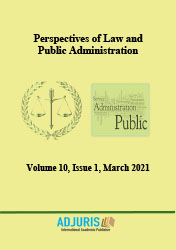GENERAL PRINCIPLES OF THE FISCAL PROCEDURE. CORRELATION OF NATIONAL LAW WITH EUROPEAN LAW IN FISCAL MATTERS
GENERAL PRINCIPLES OF THE FISCAL PROCEDURE. CORRELATION OF NATIONAL LAW WITH EUROPEAN LAW IN FISCAL MATTERS
Author(s): Cristina OneţSubject(s): Law on Economics, Public Finances, Fiscal Politics / Budgeting, EU-Legislation
Published by: Societatea de Stiinte Juridice si Administrative
Keywords: principles; fiscal procedure; the right of discretion; the right to be heard;
Summary/Abstract: This paper addresses the issue of the regulations contained in the Fiscal Procedure Code regarding the general principles that must govern the conduct of the parties throughout the fiscal procedure. The enunciation and regulation of these principles produce particularly important effects, and we have referred to some of them in the content of this paper. Therefore, the paper includes the presentation, critical analysis, observations and conclusions regarding the principle of legality of the fiscal procedure applied by the fiscal bodies of the state and of the administrative-territorial units, the unitary application of the fiscal legislation on the entire national territory, the exercise of the fiscal body's right of discretion in assessing and interpreting evidence and information that may be considered relevant for the correct determination of the taxpayer's fiscal situation, the active role recognized to the fiscal body by the legislator and under which it is entitled to examine the facts, obtain and use the information and the documents it deems useful for determining the taxpayer's fiscal situation, the official language in the fiscal administration and how documents and information presented in other languages can be used, the taxpayer's right to be heard in the fiscal administration procedure and its limits according to the practice of the fiscal bodies of the Romanian state, but also in the vision of the judges of the Court of Justice of the European Union called to censor these practices, the obligation of cooperation established by the legislator exclusively in the taxpayer's charge, the maintenance of fiscal secrecy as a general obligation of the fiscal body significantly diluted by numerous exceptions, and, last but not least, good faith in the relations between the taxpayer and the fiscal body for the correct application of the legal provisions
Journal: Perspectives of Law and Public Administration
- Issue Year: 10/2021
- Issue No: 1
- Page Range: 70-79
- Page Count: 10
- Language: English

